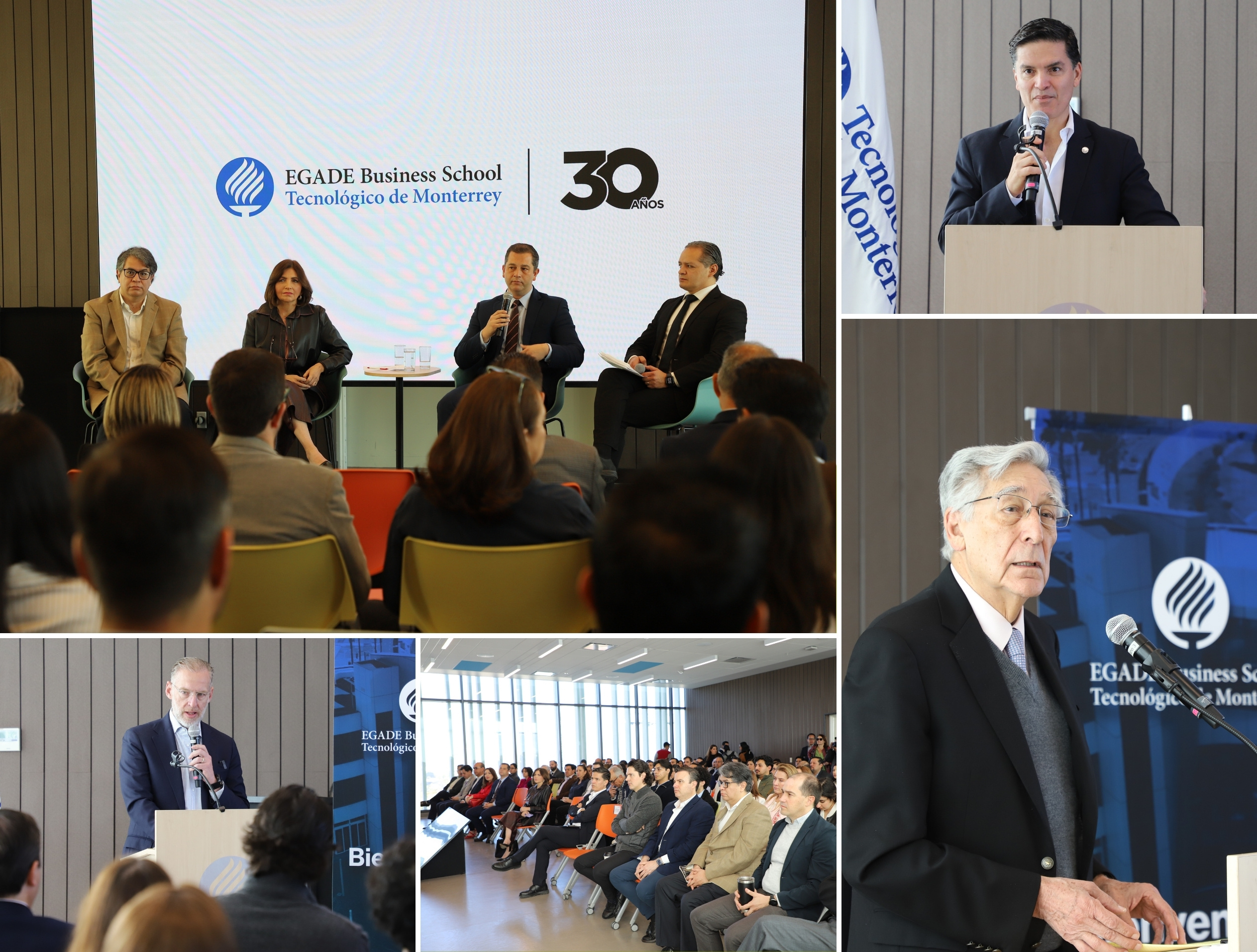Business and academic leaders discuss North America's trade reconfiguration and challenges for SMEs.
By JOSÉ ÁNGEL DE LA PAZ | EGADE BUSINESS SCHOOL
To mark its 30th anniversary, EGADE Business School at Tecnológico de Monterrey, in collaboration with the School of Government and Public Transformation (EGyTP) of the same institution, hosted the event "Economic and Political Outlook for Mexico 2025" in Querétaro, where specialists analyzed the country’s challenges and opportunities in the current global context.
During the forum’s opening, Pascual Alcocer, the General Director of Tecnológico de Monterrey Campus Querétaro, emphasized that 2025 marks the campus's 50th anniversary, reflecting its regional consolidation. He outlined three strategic priorities: academic excellence, applied research, and social impact, reaffirming the institution’s commitment to quality education and collaboration with national and international universities.
Meanwhile, Marco Antonio Del Prete, the Secretary of Sustainable Development of Querétaro, warned about the economic and political uncertainty that will mark the beginning of 2025. This uncertainty is driven by international conflicts and economic reforms in Mexico that have yet to provide certainty.
“Although Querétaro ranked fifth nationally in job creation in 2024, we observed a decrease in the absolute number of new positions, which led us to implement strategies to strengthen the labour market,” he stated.
Del Prete highlighted the state's role as a technology investment hub, citing the presence of companies like Amazon, Microsoft, and Google and stressing the need to strengthen knowledge development and innovation to diversify the economy beyond manufacturing.
MEXICO FACING GLOBAL ECONOMIC UNCERTAINTY
The event on January 31 at the Residences Building of Campus Querétaro featured a keynote speech by Everardo Elizondo, former Deputy Governor of Banco de México and Distinguished Professor of Economics at EGADE Business School.
In his lecture, titled "The 'Yesterday' and 'Tomorrow' of the Mexican Economy: Conjectures and Perplexities," Elizondo noted that, while the U.S. government has announced 25% tariffs, it remains unclear whether their implementation will be gradual or selective.
“We are facing a set of challenges that we do not yet fully understand because we still don’t know the exact scope of the problem,” he explained.
He criticized the notion that Mexico's trade surplus with the U.S. constitutes a subsidy, emphasizing that trade is mutually beneficial.
“There is no such thing as the subsidy the president refers to. There is, however, a long-standing mercantilist belief that exports are good and imports are bad,” he argued.
Elizondo also warned that Mexico’s economic growth has remained below 1% annually for decades, reflecting insufficient investment and productivity.
On inflation, he explained that despite a decline, public perception remains negative.
“People ask: ‘If inflation goes down, why do things still cost more?’ And both perspectives are correct. The government claims inflation has dropped, but that only means prices are rising at a slower rate, not that they have stopped increasing,” he clarified.
Regarding monetary policy, he affirmed that Banco de México has maintained its independence and will take a prudent approach amid global uncertainty.
PERSPECTIVES FROM THE PRIVATE SECTOR AND ACADEMIA
The event included a panel discussion on Mexico’s economic and political outlook, featuring business leaders and academics from Tecnológico de Monterrey.
Beatriz Hernández Rojas, President of Coparmex Querétaro, pointed out that political and economic uncertainty affects investment and business competitiveness, particularly for SMEs, which struggle to integrate into supply chains.
“Supply chains do not always leverage the potential of SMEs, often because they are not sufficiently prepared,” she stated.
The business leader explained that lack of certifications, limited access to financing, and high talent turnover are key barriers to their growth.
Federico Quinzaños, Founder of The Grand North America, discussed the trade reconfiguration between Mexico and the U.S.
“The United States has realized that, after 2020, it needs less globalization and more regionalization,” he noted.
Quinzaños explained that Mexico and Canada are no longer seen solely as trade partners but as part of a North American geo-economic strategy.
“The U.S. cannot compete against China without ‘food and fuel’—Canada’s energy and Mexico’s food supply,” Quinzaños emphasized.
Alejandro Díaz, Research Professor at EGyTP, analyzed how political stability in North America influences Mexico’s bilateral relationship with the U.S.
“44% of federal judges were appointed by Trump during his first term. In the Supreme Court, most rulings now favour Republican interests,” he explained.
Finally, Pablo Necoechea, Regional Director of EGADE Business School in Mexico City and Querétaro, moderated the discussion and underscored the significance of trade shifts in the global economy.
“It is important to understand all factors influencing these new trade reconfigurations and the key elements needed to make strategic decisions that lead to sustainable economic development,” he stated.
The panel highlighted the complexity of Mexico’s economic and political landscape, addressing challenges facing businesses, shifts in trade dynamics, and the impact of megatrends on global competitiveness.
With complementary insights from the private sector and academia, panelists agreed that talent development must be strengthened, innovation must be fostered, and business strategies must be adapted to navigate today's uncertainty.
